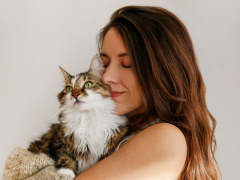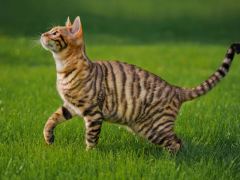
Digestive enzymes are essential for cats to digest their food and are used every time your cat eats. Without them, they can’t breakdown their food into a digestible form and they don’t absorb the vital nutrients that are contained in the food.
As you can imagine, a lack of digestive enzymes could cause many health problems for cats and a lot of worry for pet owners. We’ll cover everything that you need to know in this article.
Quick Overview: Digestive Enzymes For Cats
 Other Names: Exocrine pancreatic insufficiency, EPI
Other Names: Exocrine pancreatic insufficiency, EPI
 Common Symptoms: Weight loss, diarrhea, poor appetite, dry/poor quality haircoat, increased appetite, lethargy.
Common Symptoms: Weight loss, diarrhea, poor appetite, dry/poor quality haircoat, increased appetite, lethargy.
 Diagnosis: Fecal sample, general bloodwork, Trypsin-like immunoreactivity (TLI), Cobalamin and folate levels, abdominal ultrasound.
Diagnosis: Fecal sample, general bloodwork, Trypsin-like immunoreactivity (TLI), Cobalamin and folate levels, abdominal ultrasound.
 Requires Ongoing Medication: Yes
Requires Ongoing Medication: Yes
 Vaccine Available: No
Vaccine Available: No
 Treatment Options: Pancreatic enzyme replacement therapy, cobalamin (vitamin B12) supplementation, other symptomatic therapies as needed.
Treatment Options: Pancreatic enzyme replacement therapy, cobalamin (vitamin B12) supplementation, other symptomatic therapies as needed.
 Home Remedies: None
Home Remedies: None
What Exactly Are Digestive Enzymes?
Firstly, we need to talk about what enzymes actually are. Enzymes are proteins that are present in almost every cell in the body. They create chemical reactions in the body that help to perform important roles including; digestion, building muscle and destroying toxins.
As mentioned, enzymes have different roles in the body but we’re going to focus on enzymes that help cats to digest their food. Digestive enzymes break down food into smaller molecules that can be digested and absorbed by the body.
There are three main digestive enzymes; amylase, lipase and protease. They each have their own role in digesting food. Protease breaks down protein into amino acids, lipase breaks down fat into glycerol and fatty acids, and amylase breaks down carbohydrates into simple sugars.
How Do Cats Get Digestive Enzymes?
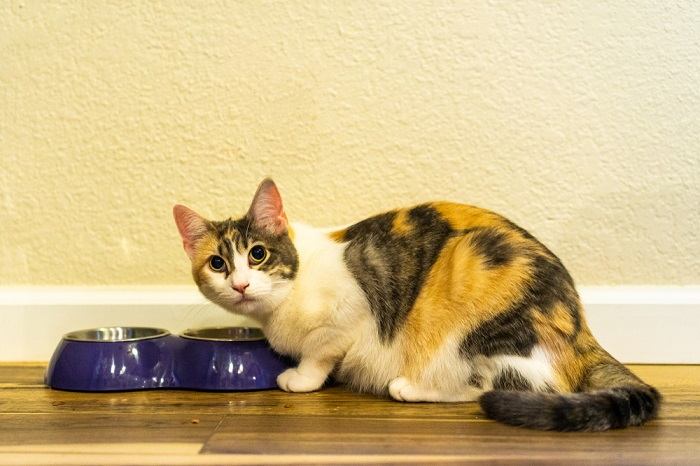
Lack of digestive enzymes in cats can lead to serious issues, dry, poor coat quality being off of the most noticeable ones
Cats have their own in-built digestive enzymes which are naturally produced in the pancreas and get to work immediately when your cat starts eating.
They get released by the pancreas and are excreted into the small intestines after your cat eats a meal. These are vital for nutrient absorption and to ensure that your cat gets all the goodness from their food.
What Happens When Cats Don’t Produce Enough Enzymes?
Normally, cats naturally produce enough enzymes to perform this function but it doesn’t always work like this. Some cats don’t produce enough digestive enzymes and this can cause a variety of clinical signs that make your kitty unwell, including but not limited to;
- Diarrhea (can be chronic or intermittent)
- Bloating
- Increased appetite
- Dry, poor coat quality
- Weight loss
- Vomiting
- Lethargy
Basically, if you can imagine eating food but not absorbing any of the nutrients or goodness, you’ll get a cat that isn’t thriving and doesn’t look healthy.
What could cause your cat to not produce these enzymes? Well, a few medical conditions can cause this. Particularly, conditions that cause damage to the pancreas (which as we already know, produces the digestive enzymes).
These can include;
- Congenital issues
- Cancer
- Fluke
- Duct blockage
- Pancreatitis
Out of all of these, chronic pancreatitis is by far the most common cause of pancreatic damage. This can lead to damage of the exocrine part of the pancreas, which can cause a condition called ‘Exocrine Pancreatic Insufficiency’, or more commonly known as EPI.
This is when the cells that produce pancreatic enzymes are permanently damaged, resulting in reduced or a complete lack of digestive enzymes made.
Symptoms of EPI can include;
- Vomiting
- Diarrhea
- Stool color change
- Weight loss
- Variable appetite – sometimes increased
- Poor coat quality
- Lethargy
If you think your cat has symptoms of EPI, it’s worth booking a visit to your vet. It can be diagnosed on a blood test called trysin-like immunoreactivity test (TLI). Your vet might also carry out routine bloods and check folate and cobalamin (vitamin B12) levels as these sometimes need to be supplemented in a cat with EPI.
Apart from the pancreas, conditions affecting the digestive tract (e.g. inflammatory bowel disease, altered stomach pH etc.) can also cause a lack of digestive enzymes but in general the pancreas is the most common cause.
There are some ideas out there, that certain pet foods can cause a lack of enzymes. The idea is that the heating process involved in making certain pet foods, can damage or denature the enzymes contained in the food.
This is reported to result in decreased enzyme intake in the diet, relying more on the pancreas to produce enzymes. However, further research and evidence in this field is needed but I’ve included this in my article to acknowledge that it is a popular belief.
Theoretically, a cat that produces enough of their own enzymes shouldn’t need any supplementation in their diet but it is important that they’re on a good quality food. If you have any doubts that your cat isn’t producing/getting enough enzymes, talk to your vet about the options available.
What Do We Do When Cats Don’t Produce Enough of Their Own Enzymes?
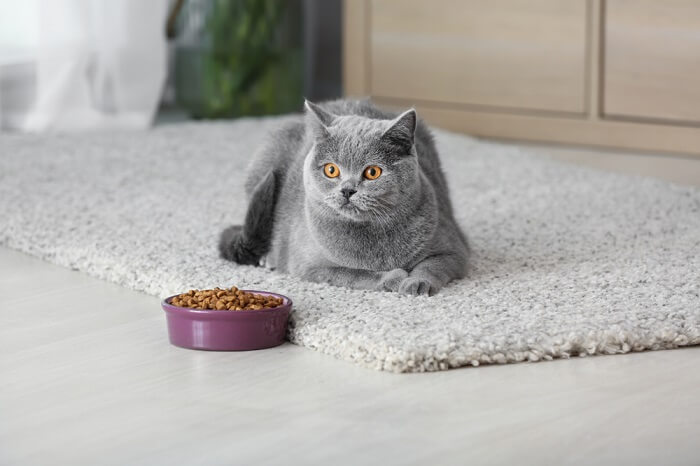
Supplementing cat’s nutrition with supplements that include enzymes such as amylase, lipase and protease is a successful way to increase your cat’s own production of digestive enzymes
When cats don’t produce enough of their own natural enzymes, we supplement these in their diet. Commercially available enzymes often come in powder or capsule form and include the three main enzymes amylase, lipase and protease.
Some supplements also include an enzyme called cellulase, which breaks down fiber (hay, leaves) and isn’t needed for cats. It’s contained in some supplements that are derived from plant sources.
Many supplements will also contain probiotics, which are live, beneficial ‘good’ bacteria. There are lots of bacteria in the normal intestines of a cat, good and bad, these together are called the microbiome.
When there’s an imbalance in the microbiome, this can cause digestive issues for the cat. In this way, the addition of probiotics can help with a digestive upset and can also boost the immune system in some cases.
These aren’t to be confused with prebiotics, which are non-digestible fibers which promote the growth or ‘feed’ the good bacteria in the gut. There is less research on prebiotics, compared to probiotics, but they are believed to have many benefits.
Should You Be Giving Your Cats Enzyme Supplements?
In simple terms, if your cat seems healthy and has no digestive issues, there’s no indication to supplement their diet with digestive enzyme supplements. If however, you suspect that your cat is lacking in digestive enzymes, it’s worth visiting your vet before supplementing your cat’s diet.
Your vet will examine your cat thoroughly and take a history from you. They might do some blood tests and perform further investigations to determine the cause of your cat’s issues.
If you start supplementing your cat’s diet without a veterinary exam, you could be missing another illness or disease. Some supplements can also have side effects e.g. vomiting, diarrhea, oral ulceration. For these reasons, it’s best to rule out other causes first.
If you do need to start giving your cat enzymes, be aware that there are a lot of products circulating that haven’t necessarily passed safety and quality testing. When buying a product, make sure that it’s of good quality and from a reputable source.
Ideally, source this from your vet or on your vet’s recommendation. Also, bear in mind that some supplements will be from animal sources so this may affect your cat if they have allergies or sensitivities to certain proteins. For example, a cat that has food sensitivity to pork may react to a supplement that has enzymes from pigs.
Similarly, probiotics and prebiotics don’t necessarily need to be given if your cat seems healthy and happy. If your cat has digestive issues or a damaged immune system, they may be beneficial.
Generally, prebiotics and probiotics are quite safe to give and rarely have any side effects. However, it’s best to consult your vet first before adding prebiotics or probiotics to your cat’s diet as there are lots of options out there.
Take Home Message
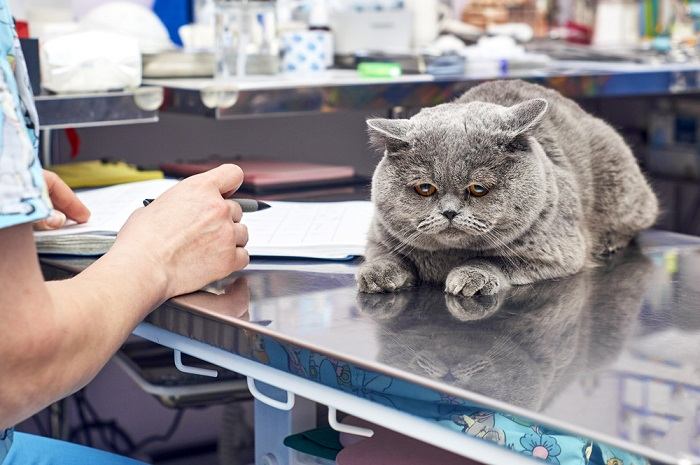
In summary, cats need digestive enzymes to function properly and to process their food. If they lack these enzymes, it can cause serious health issues for your cat.
The main condition that can be caused is EPI, which can be detrimental if untreated. However, the good news is that EPI is relatively uncommon in cats and the enzymes can be supplemented in the diet if this is diagnosed.
If you’re worrying that your cat should be getting dietary supplements, don’t! As long as your cat seems healthy and has no symptoms, there are no indications to supplement their diet. Ensure that your cat is on a good quality pet food diet and has good healthcare to keep them in tip top shape.
Also Read: 10 Subtle Signs Your Cat May Be Sick
Frequently Asked Questions
Are digestive enzymes safe for cats?
In general, digestive enzymes that are of good quality and from a reputable source, are safe for cats. There have been some reported side effects to supplementation e.g. vomiting, diarrhea, oral ulceration, food hypersensitivities. It's best to seek the advice of your vet to see if supplementation is necessary.
What digestive enzymes are good for cats?
Cats need three digestive enzymes to process their food; amylase, lipase and protease
What are the symptoms of lack of digestive enzymes?
Symptoms can include but aren't limited to; vomiting, diarrhea, poor coat quality, altered appetite (sometimes increased), bloating, weight loss, lethargy.
What are the side effects of digestive enzymes?
Side effects can include; vomiting, diarrhea, oral ulceration. Side effects are usually rare.





